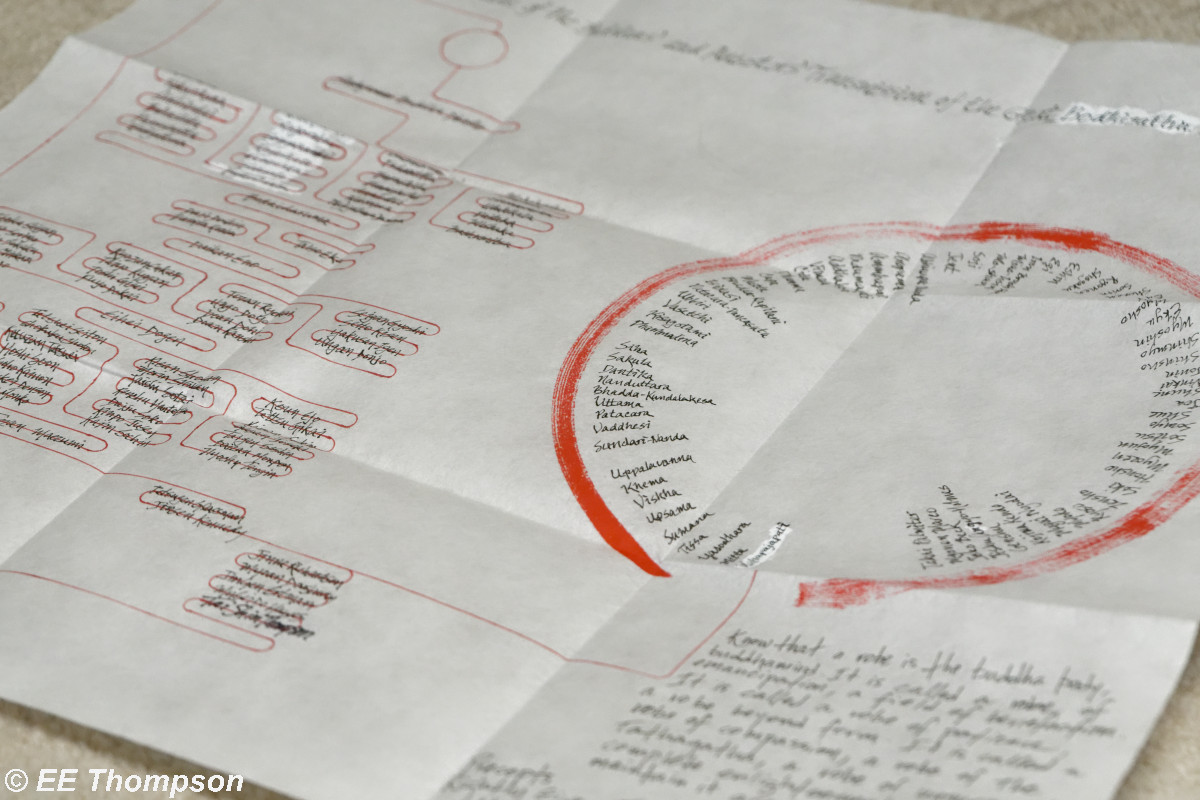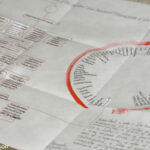This spring, after I thoroughly screwed up my lineage chart, Zen went empty.
The lineage chart
Last May, two of my sangha mates were receiving the precepts. As they handed in their rakusus and lineage charts, they chatted about how afraid they had been of making mistakes. It set the expectation in my mind that I had to make the complicated chart perfectly. My understanding wasn’t unfounded. Unfortunately, it’s easy for me to buy into perfection narratives. There is a narrative of perfection in all of Buddhism, including Zen. We chant the Prajñāpāramitā or “perfection or wisdom” Heart Sutra often in the Zendo. Perfect wisdom leads to the realization of emptiness and freedom. I wasn’t too worried though. I used to enjoy drawing with India ink.
India ink only works with dip pens, which seemed risky. I wanted the controlled flow of a fountain pen. Sensei said most fountain pen inks bleed on the absorbent rice paper and suggested ultra fine Sharpies. I didn’t like how Sharpies looked though, so I ordered some ink samples. If you’re curious, De Atramentis document inks or Platinum Carbon bleed minimally. Sakura Pigma markers also work better than Sharpies. After I chose inks, I filled a Pilot Metropolitan stub and started tracing.
I drew the blood line neatly enough, but things went to hell in a handbasket on the names. First I misspelled a name on the women ancestors. Then another. I couldn’t believe it. Shaken, I moved on to the main lineage. Next I put a name in the wrong column, throwing everything off. After that I accidentally shifted the position of names on the blood line, though they were still in the correct order. The final, devastating error was a mistake in the title. There is no way to correct ink on rice paper and I didn’t know what to do. By the end I was sobbing.
Projections
I spent the next couple days alternating between angry, embarrassed, and sad but the strongest feeling was deep shame. I had to show this mess to Sensei at some point. What would he think? He had given me this nice piece of rice paper and I’d ruined it. I was clearly a terrible Buddhist. Could I get another? What if I screwed that up too? Why was I even taking up the precepts in the first place? Did I really want to stick to Zen?
As I watched my thoughts, I saw myself projecting in interesting ways. For better or for worse, projecting onto a teacher is really common in Zen. Sensei is rarely prescriptive, so most of what I think about his feelings or opinions is delusional. Sensei primarily talks about his own practice, and overall he is a kind man of few words. The only thing I know for sure is that he actively avoids harming his students.
I gnashed my teeth about his unfair expectations of perfection, than realized he’d never said I had to draw the lineage perfectly. That idea came from my interpretation of an overheard conversation between students. I braced for disappointment, but he’s never shown either approval or disapproval of my practice. The more I rehearsed mentally for a negative reaction, the more I realized how little he had actually said. All sensei did was give me paper and a chart to trace, the list of names, and some concrete suggestions about how to draw the chart like using a pen cap and ruler to get a neater blood line. When I asked about pens he gave me a scrap of paper to test inks. He didn’t say a single word about the outcome.
If a tree falls…
A couple days later I was feeling a little better. I put everything away since I wasn’t sure what to do about the mistakes, deciding that the worst case was that I had a screwed up lineage chart. Nobody needs to see it except your teacher. What mattered more to me was my rakusu I’d have to wear around the zendo and that was going pretty well. I know how to fix sewing mistakes, having made plenty of them growing up.
I finished cleaning up and started idly flipping through Zen is Right Here, The Wisdom of Shunryu Suzuki. The book is a compilation of quotes and brief stories about Suzuki Roshi. Some are funny, some are poignant, and some are completely ordinary. I landed on a page with Dr. George Berkeley’s famous philosophical question that is often mis-attributed as a Zen koan.
A student asked in dokusan, “If a tree falls in the forest and no one hears it, does it make a sound?” Suzuki Roshi answered, “It doesn’t matter.”
What? The answer doesn’t matter? Then the question must not matter either… The realization hit me like a gut punch. It’s not unusual for me to gasp when an insight ambushes me but this was a whole different level. All of a sudden Buddhism, spirituality, and the entirety of my external search for meaning dropped away. I stood and waited to catch my breath as the understanding fully unfolded. The answers are not external; they lie within. Zen teachings are empty and the way is right here. That’s what Huángbò meant when he said all of written and spoken Buddhism is merely a skillful means to attract people interested in awakening. Then I realized I was angry. I’ve been a “spiritual seeker” for most of my life. I even landed in a cult for a time, with devastating consequences. Had it really all been a fool’s errand?
What now?
Despite my initial reaction, the mental shift has been largely positive. Happily, all my worries about the lineage chart vanished. It became nothing but paper. It was also probably fastest cult deprogramming on record. I was able to discard all the Lenz-adjacent books without a second thought. A few weeks later in dokusan, I told my teacher about my lineage chart and the subsequent realization. When I concluded, he said he didn’t feel the need to give me another piece of rice paper. Instead, he said it’s pretty common to use Wite-out on complicated Soto silks. He also said, “Some people say Zen is just a series of mistakes; others say Zen is one giant mistake.” and opined that he’d like to hear the debate.
I was curious whether other people have similar experiences and I’m grateful to Sensei Domyo Burk for sharing hers on a podcast. Now I understand what Norman Fischer Roshi meant when he wrote, “Zazen is fundamentally a useless and pointless activity.” Or Sawakai Roshi’s infamous remark that “Zazen is good for nothing.” Since there is nothing external to find, I can’t expect anything to happen on the cushion. Tenshin Roshi’s delightful podcast, “Mistake,” where he humbly lays out his own mistakes in practice was also very helpful.
The downside is that it’s been harder to find motivation to sit. I have to remind myself that it’s what got me here in the first place. Aimless sitting clearly helps me drop away unhelpful ideas and stories. I may as well stick with it and see what else happens. After all, I’m still thoroughly deluded. My practice has shifted into non-seeking though, and there is a lot more room for error. It will be interesting to see what comes next.





